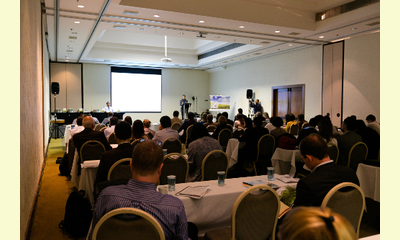|
|
Sustainable Foods Summit: New Horizons for Eco-Labels and Sustainability
un article par Sustainable Foods Summit
The inaugural Latin American edition of the Sustainable Foods Summit drew to a successful close in São Paulo [27-28th March]. About 140 senior executives from the food industry discussed sustainability issues over the 2-day summit. There were calls to develop local markets for sustainable foods in the region, as well as prevent the proliferation in sustainability schemes. View the summit pics here.

click on photo to enlarge
The summit covered a diverse range of sustainability subjects, such as green commodities certification, biodiversity impacts, sustainable coffee & seafood, social media, green consumer behaviour, food safety in supply chains, sustainability in foodservice, bioplastics in packaging, and ecodesign approach. The summit proceedings are available for a small professional fee. Click here for further details.
The Sustainable Foods Summit is a series of international summits that focuses on the leading issues the food industry faces concerning sustainability and eco-labels, such as Organic, Fair Trade, Rainforest Alliance, UTZ Certified, etc. The next edition of this international series of summits will take place in Amsterdam on 5-6th June 2014. The summit will look at the evolution of food eco-labels and discuss sustainability best-practices in the food industry.
The aim of the Sustainable Foods Summit is to explore new horizons for eco-labels and sustainability in the food industry by discussing key industry issues. How do organic, fair trade and other eco-labels further sustainability? When, if ever, will there ever be a single sustainability standard for food products? What are best-practices in measuring sustainability performance? Such issues are regularly addressed at each summit.
Who Should Attend?
The Sustainable Foods Summit is devised for key stake-holders in the food industry that include:
Food & beverage companies
Ingredient & raw material suppliers
Retailers & distributors
Packaging companies
Industry organizations
Certification agencies
Academics & researchers
Investors & financiers
[Thank you to the Good News Agency for alerting us to this article.]
|








|
DISCUSSION
Question(s) liée(s) à cet article:
How can we get to a sustainable, peaceful economy?,
* * * * *
Commentaire le plus récent:
Annie Leonard: How to Be More than a Mindful Consumer
The way we make and use stuff is harming the world—and ourselves. To create a system that works, we can't just use our purchasing power. We must turn it into citizen power.
by Annie Leonard
posted Aug 22, 2013
Stuff activist Annie Leonard: “Consumerism, even when it tries to embrace ‘sustainable’ products, is a set of values that teaches us to define ourselves, communicate our identity, and seek meaning through accumulation of stuff, rather than through our values and activities and our community.” YES! photo by Lane Hartwell.
Since I released "The Story of Stuff" six years ago, the most frequent snarky remark I get from people trying to take me down a notch is about my own stuff: Don't you drive a car? What about your computer and your cellphone? What about your books? (To the last one, I answer that the book was printed on paper made from trash, not trees, but that doesn't stop them from smiling smugly at having exposed me as a materialistic hypocrite. Gotcha!)
Let me say it clearly: I'm neither for nor against stuff. I like stuff if it's well-made, honestly marketed, used for a long time, and at the end of its life recycled in a way that doesn't trash the planet, poison people, or exploit workers. Our stuff should not be artifacts of indulgence and disposability, like toys that are forgotten 15 minutes after the wrapping comes off, but things that are both practical and meaningful. British philosopher William Morris said it best: "Have nothing in your house that you do not know to be useful or believe to be beautiful."
Too many T-shirts
The life cycle of a simple cotton T-shirt—worldwide, 4 billion are made, sold, and discarded each year—knits together a chain of seemingly intractable problems, from the elusive definition of sustainable agriculture to the greed and classism of fashion marketing.
The story of a T-shirt not only gives us insight into the complexity of our relationship with even the simplest stuff; it also demonstrates why consumer activism—boycotting or avoiding products that don’t meet our personal standards for sustainability and fairness—will never be enough to bring about real and lasting change. Like a vast Venn diagram covering the entire planet, the environmental and social impacts of cheap T-shirts overlap and intersect on many layers, making it impossible to fix one without addressing the others.
I confess that my T-shirt drawer is so full it's hard to close. . ... continuation.

|
|









